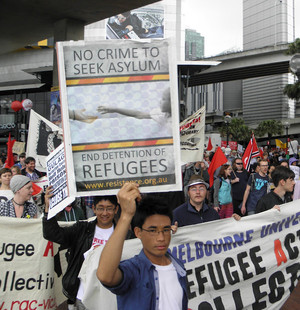By Jay Fletcher
Fewer than 50 Hazara refugees from Afghanistan survived when a refugee boat sank en route to Australia on August 29. Amid the tragedy and horror, Australian politicians have stormed and blustered over so-called people smugglers selling refugees “a ticket to the bottom of the sea”.
Immigration minister Chris Bowen and home affairs minister Jason Clare made absurd claims that “people smugglers” were running a “closing down sale” to explain the rise in boats in the wake of a bipartisan return to offshore processing.
But former ambassador and author Tony Kevin told Green Left Weekly that if it wasn’t for a “sickness at the heart” of Australia’s border protection system, “possibly all lives could have been saved … As it is more than 100 people died.”
Kevin has just published his new book, Reluctant Rescuers, which looks at four refugee boat disasters since the SIEV X refugee boat sank in 2001 and killed 353 people — a still unexplained catastrophe chronicled in his 2004 award-winning book A Certain Maritime Incident.
Reluctant Rescuers is a deep and exhaustive forensic analysis of how four boats came to fatal ends on the seas between Indonesia and Australia. It concludes that Australia’s negligence, collusion and obstruction contributed much more than any “evil people smugglers”.
“It goes back to SIEV X as a reference point under the [John] Howard government,” Kevin said. “But it deals further with the two boats that went missing in 2009 and 2010, the Christmas Island ship wreck [in December 2010] and the foundering of the Barokah off Java [in December last year].”
It makes the case “that our border protection system [has] a sickness at the heart of it. It cannot treat asylum seekers fairly”.
The book is heavily detailed, with facts, documented evidence, quotes on the public record and events retold through testimonies made at several key inquiries.
Allowing for only minimal speculation, drawn from Kevin’s 30-year experience as a diplomat and government advisor, he paints a disturbing picture of how Australia’s border authority, customs agency, the Australian Maritime Search Authority and government personnel in each case dithered, delayed and failed to act with a duty of care that resulted in hundreds of deaths.
Far from a dry read, the stories are gripping and tragic. It is chilling to see border control correspondence from cables released under Freedom of Information that say a sinking or missing boat is not a “danger” because it is in Indonesian waters and therefore not the responsibility of Australian search-and-rescue teams.
In the book, Kevin says Border Protection Command, which handles the “interception” of every boat that enters Australian waters, uses its resources according to “risk based intelligence”.
“But the ‘risk’ here,” he writes, “does not refer to any risk to passengers’ safety of life at sea: it is the ‘risk’ of their reaching mainland Australia and thus being legally able to claim refugee status here.”
He told GLW he found this has a profound link to the Australian political rhetoric of “deterrence”. Australia’s border protection policy — which amounts to keeping out refugees — has “corrupted” its own search and rescue system.
“If you’re constantly trying to deter people, that infects your search and rescue response. Half the time you don’t believe them, they’re trying it on or after a water taxi. Even if you do believe them you try in every way to push them back, you try to push them back to Indonesia, you try to engage the Indonesian search and rescue, and it’s their problem.
“All this rhetoric is designed the criminalise people who go on boats. I’m saying this has got to stop; we’ve got to stop responding to distress signals as if they don’t matter very much.”
The tragedy on August 29 could have been averted if not for this negligence, Kevin said.
It is still unclear what took place on August 29. But Clare has admitted that Australia received two distress calls, which it forwarded to Indonesia.
But Indonesia’s under-resourced search and rescue service didn’t begin looking until six hours later and called off the search after finding no trace of boat debris or survivors.
Only then did Australia finally act, but 24 hours passed before the first survivors were pulled from the water. Forty-four survivors, including one woman and one child, were finally rescued by Australian navy vessel HMAS Maitland, and taken to Indonesia.
Among the lost was a baby about three months old, survivors told Fairfax journalists.
Kevin says the appalling events “really validate and confirm the analysis in the book that we provide a second class search and rescue service to asylum seeker boats, and as a result when things go wrong people die.”
“We wouldn’t dare provide such as second rate service to Australian boats or any registered international merchant vessel. A distress signal from any boat has to be treated exactly the same way.”
Anyone that wants to have a say in Australia’s refugee “debate” should carefully read this book and consider who is really to blame for innocent people in peril at sea being left to their fate.
[Reluctant Rescuers is available for order from reluctantrescuers.com.]